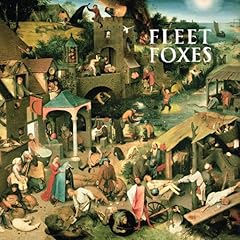Saturday, August 8, 2009
Harvey Danger, live @ Harper's Ferry 8.7.2009
Wine, Women, & Song
Meetings with Remarkable Men (Show Me the Hero)
Cream and Bastards Rise
Old Hat
Moral Centralia
Little Round Mirrors
War Buddies
Jack the Lion (piano version)
The Show Must Not Go On (new song)
Private Helicopter
Flagpole Sitta
Ballad of the Tragic Hero (Pity & Fear)
Authenticity
Sad Sweetheart of the Rodeo
[set break]
Pike St./Park Slope (Sean and Jeff duo)
Humility on Parade
(Theme from) Carjack Fever
Carlotta Valdez
Radio Silence
[encore]
Terminal Annex
Picture, Picture
The Same as Being in Love (super extended)
I will miss this band like no other. Really, they saved me from the depths of listening to crap like Korn and Limp Bizkit when I was in 8th grade, taught me that lyrics are important, lead guitar isn't always necessary, and just generally what amazing music ought to sound like. I must credit them for the musician/music appreciator/person I am today. Best of luck to all of them in the future.
Tuesday, May 26, 2009
New Music Tuesday: Grizzly Bear
Grizzly Bear - Veckatimest [Warp, 2009]

The main thing to know about Grizzly Bear, is that their music is very atmospheric-- I once told a friend that Grizzly Bear know how to utilize silence better than any other rock band in modern music. That was most certainly true about their 2006 masterpiece, Yellow House, and certainly holds up here, though to a lesser extent. Still ever-present are the bone-chilling harmonies of Ed Droste and Dan Rossen, along with the sparse, hollow drumming of Chris Bear. The band sticks to what it is good at in terms of song structure, with tracks that plod along to a majestic build and often-epic finales. However, a lot of my favorite elements from their old records have gone missing-- piano with a sound as if it was played in the parlor of an abandoned mansion, banjo, woodwinds, and (tasteful) glitchy electronic noise. Still, I do have to give the band credit for somehow managing to use steel drums in multiple tracks and not have them suck.
So let's get straight to the songs: are they good? Yes, they are! Well, most of them, anyway. Opener "Southern Point" comes out of the gate rocking, with organ, fuzz bass, and swirling guitars galore. The band keeps the energy high with the harmony- and omnichord-laden "Two Weeks" (see the video for it here c/o Stereogum). Next, a step back in intensity with the haunting "All We Ask," which builds at the end, and carries over into my favorite track, "Fine For Now." By this point in the album, I was practically drooling.
The one thing I hear most from Grizzly Bear's detractors is that they find the band "boring," and unfortunately, I have to agree with this assessment on a few tracks of Veckatimest. As the album draws near its middle, some of the tracks start equating sparseness with boringness. "Cheerleader" and "Dory" plod along through typical song structures, never really building to anything, and never really reaching a moment of musical beauty seen in some of their more enjoyable minimal tracks (take "Colorado" from Yellow House, for example). "Ready, Able" breathes some life back into the middle chunk of the album, but it's all but sucked back out by the next two largely forgettable tracks.
Fortunately, the album closes with a trio of very excellent tracks (including Pitchfork-perfect "While You Wait for the Others"), and you're left with a desire to go back and find the subtle layers only found on multiple listens that are so essential to Grizzly Bear records. It's interesting that Veckatimest should be released in the summer, when it feels a lot like a sleepy fall or winter record, and that its rival, Merriweather Post Pavilion, dropped in January and feels like a summertime party. Both records have their merits, and rather than bash one and love the other, I'm just going to be glad that Grizzly Bear more or less lived up to their hype and that 2009 has been a pretty great year for music so far.
download: Fine For Now
download: Southern Point
Grizzly Bear play the Berklee Performance Center on June 3, and this kid has a 1st row 1st mezzanine ticket. I highly expect this show to be amazing, and recommend that you check them out in Boston or wherever they are playing near you!
Saturday, April 25, 2009
The Friday Find: Cornershop
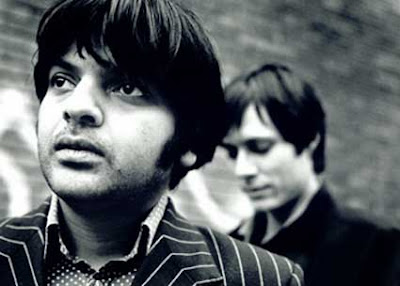
Cornershop is the brainchild of Tjinder Singh—British and of Indian descent, which greatly influences Cornershop's music. Named after a reference to the stereotype in Britain that Indians and Asians owned streetcorner shops, Singh and his shifting lineup of musicians create a sound that perfectly combines the best of Eastern and Western music with seamless fusion, leaning heavily on British indie, pop, and dance from the mid-90's. Their breakout album, 1997's When I Was Born for the 7th Time, featured an eclectic mix of turntables, synthesizers, samplers, guitars, and traditional Indian instruments like the sitar, dholaki, or tambura.
If the name sounds vaguely familiar to anyone, it is probably because Cornershop scored a major hit off their previously mentioned album, thanks to Norman Cook's (aka Fatboy Slim) remix of their song "Brimful of Asha," a tribute to music (especially that of Asha Bhosle) in Indian film. The remix was very subtle, but its increased dance tendency and name recognition propelled it to the top of British and US charts. Here's the music video for the remix, which is terribly 90's and quite frankly kind of embarrassing:
Anyway, the real find—and track that I want to share—is off of their criminally underrated 2002 album Handcream for a Generation. "Spectral Mornings" is the pinnacle of their music, in my mind. It's a 14-minute opus that begins with some Indian singing and evolves into a sprawling psych jam of sitar and guitar mastery (Noel Gallagher of Oasis lends a hand for the guitar portion). I have no clue what this song is about and I could really care less!
Download: Spectral Mornings
Download: Brimful of Asha (Norman Cook Remix)
Apparently, Cornershop are expected to release their 6th album, Cornering the Market some time in 2009, so keep an eye out, since 7 years between albums seems to suit them just fine.
Tuesday, April 21, 2009
New Music Tuesday: Wooden Shjips
Wooden Shjips - Dos [Holy Mountain, 2009]

There isn't entirely a lot to say about this group's second album proper-- and that isn't necessarily a detraction. Wooden Shjips take a modern day stoner rock approach to the heyday of Krautrock by way of Can and Neu!, with a liberal dose of late 60's psychedelia along the lines of The Doors and The Velvet Underground. Now, that is a lot of great bands to be compared to in one sentence, and by no means is Wooden Shjips even close to any of them.
Here is how an average Wooden Shjips song from Dos goes: jam on a looped riff, heavy in bass, organ, and crunchy guitar with a little tinge of blues. Then, sing some mumbled, barely decipherable lyrics for a minute or two, followed by a return to the main loop for two to eight minutes of the most distorted, delayed, and reverbed guitar solo possible.
But if everything is so predictable and repetitive, why do I find myself enjoying it so much? For one thing, guitarist Ripley Johnson's solo work is amazing. And it has to be-- with the bass and organ looping for four to eleven minutes (you have to give props to whichever of them recorded tambourine for 11 minutes straight), the vocals and guitar solos are what really make any distinction between tracks. The guitar work tends to favor noise over melody, which doesn't really matter since the band is looping a one- or two-chord short riff anyway, and for the most part, I feel like this is what keeps me interested in Wooden Shjips. That and 60's psych nostalgia.
Feeling adventurous? Down by the Sea (off Dos) 10:53
Or maybe more concise... We Ask You to Ride (off 2007's Wooden Shjips) 4:53
Hear and learn more @ their myspace
Sunday, April 19, 2009
Opinion: The Pirate Bay and The Future of Music

So, what does this mean for the world of music? Certainly, it's nothing new that file sharing websites have been attacked and shut down by courts (anyone fondly remember Napster and Kazaa? Yeah, I don't either). I'd guess that of anyone reading this, maybe 10% have used The Pirate Bay to download an album or a song, so is there any reason to lose sleep over this decision? Not really. So, I'd like to examine a more interesting polemic opened up by this decision: the value of music as an art form.
My desire to write on this subject was piqued while reading this post by one of my favorite bloggers, Momus, and the discussion that followed in its comments section. The overall question is this: What is more important-- cultural value or monetary value, and, how will musicians/artists adapt new technologies to help them make a living?
Let's tackle the latter question, since it is undoubtedly easier to discuss. In the scary world of "the internet," record labels are looking all the more useless. Bands and musicians are increasingly able to create and distribute their work on their own, get noticed by internet-based critics and promoters, and book their own shows (granted, the internet hasn't necessarily made the booking manager obsolete). Momus opines that we will see a shift of moving the payday from the record store to the concert venue. Essentially, what we may see are musicians that create an income largely through ticket sales, merchandising, and advertising. In this sense, it becomes more valuable to allow your music to reach as many ears as possible, through widespread, free distribution (it's not really realistic to claim the Radiohead "pay what you like" experiment as an applicable model that could work for every upstart indie band).
Back to the former question, what value does music have in our collective culture vs. how much money we are willing to pay for it? The idea behind purchasing a CD is to pay money to an artist (and label) that has produced music. In most cases, big label albums have big label budgets to make, and there is an expectation that the cost should be recouped. After the cost has been recouped, both parties then begin to profit. But is an artist who is successful commercially, necessarily valuable culturally? Of course not. So why then, is there a need to perpetually reward musicians for each unit sold from a one-time album creation? A comment on Momus' post points out that we don't pay each and every time we look at a painting. Just because music as a medium has lent itself to distribution through vinyl records, 8-tracks, cassettes, compact discs, should we all have to pay for the privilege to experience it?
So, here we are back to the central idea, also suggested by The Pirate Bay suit-- should music be free? I am hopeful that the world of music will come to a point where it can be. This is not to say I want all musicians to be poor, I just believe in the shift proposed by Momus-- for example, I feel much better spending $10 to see a concert than I do spending $10 to buy an album. Am I not supporting the musician properly because I choose to buy a concert ticket rather than an album? If I had to guess, I would think that a band playing a show for 200 people at $10 per ticket would make much more money than having 200 people go buy their CD at Best Buy.
As much as I love browsing local record stores (just picked up some limited 7" on Record Store Day), I have to assume that down the road they will become a thing of the past (the premise of an upcoming documentary, I Need That Record! showing at the Boston Independent Film Festival). I am just hopeful that this will be due to a shifting model of a band/musician's ability to market themselves, and not the triumph of big box stores and record labels.
Tuesday, April 14, 2009
New Music Tuesday: The Decemberists
The Decemberists - The Hazards of Love [Capitol, 2009]
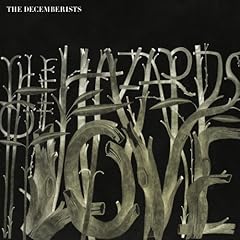
So, I was aiming to get this out a week or two ago, since the album just launched on March 24 and I wanted to weigh in as this promised to be one of the most interesting and polarized releases of 2009 so far. There are fans old and new that either love it or hate it. Pitchfork bashed it on national television. Blogs have run the full gamut from "masterpiece" to "a nice idea that fell flat."
And well, I expected nothing less. When hearing about the album a few months ago, frontman Colin Meloy revealed that it was going to be a rock opera full of prog metal (essential for any rock opera) while incorporating The Decemberists' folk/sea shanty signature sound. I was intrigued, but skeptical. In 2006, The Crane Wife was released to much ballyhoo, but I was overall displeased with it, since it sort of walked a line between proggy, epic narratives and simple, catchy folk sing-a-longs. What I wanted was an album full of one or the other (since I had enjoyed their past efforts very much, and was intrigued what an epic album would bring).
Needless to say, The Hazards of Love is all kinds of epic. The opening track (discounting the Prelude) "The Hazards of Love 1" instantly brings to mind the folk-jazz guitar and bass interplay of the best 60's folk in the style of Pentangle or Fairport Convention. I had long doubted The Decemberists actual roots in folk, but as of this album, I am a believer. Of course, as soon as the track concludes, distorted guitars crunch in true 80's metal fashion. This may seem disorienting, but somehow Meloy et al. managed to pull off the 180-degree switch effortlessly.
This is the setup of the musical interplay throughout the album. With a surprisingly concise plot (once you have the aid of the lyrics sheet), the music shifts in the standard operatic/musical mode of recurring themes and reprises to accentuate moods, characters, and events. Meloy goes so far as to recruit two female vocalists to further flesh out the sound of the "opera." Becky Stark (of Lavender Diamond) lends her sweet voice as Margaret, the lover of Meloy's character William. The show-stealer on the album however, is most certainly Shara Worden (of My Brightest Diamond) in the role of the Queen, whose perfect 80's metal wails send chills down the spine. Where the album truly succeeds is in its pairing of music with emotion as the plot develops (the details of which I'll spare in the interest of seeming sane). The closing track where the lovers drown together (oops, spoiler) is truly a beautiful and moving piece of music, and Meloy and The Decemberists' ability to draw out so much emotion through a stunning amalgam of music styles is really what makes this album a success.
If you're looking to hear something totally different and feeling a little adventurous stylistically, this is definitely the album of 2009 to pick thusfar. While I think this album NEEDS to be heard as a whole, in the interests of not being shut down, I'll just share my top picks. Contact me if you want the whole shebang:
The Hazards of Love 1 (jazz-folk goodness)
The Wanting Comes in Waves / Repaid (highlights Shara and some of the prog-metal)
Annan Water (mostly Meloy and mandolin)
Catch The Decemberists live in Boston June 9 at the BOA Pavilion (with Robyn Hitchcock-- this show will be awesome), or next weekend April 24th at Amherst College (I'll be there!)
Saturday, March 21, 2009
Tuesday, March 17, 2009
New Music Tuesday: The Love Language

Comin' at ya from Raleigh, NC, I recently saw this awesome band open for The Rosebuds (also an awesome band) back in January at the Middle East. I had just seen some band whose name I can't remember chug through a few closing tracks that sounded like terrible Jimmy Eat World songs and had very low expectations. Needless to say, they rocked, and I've been listening to their album that they had for sale ever since.
Imagine my surprise to see that the album's actual street release date is today of all days! So, I am here to laud them, as hopefully other, more influential blogs will be doing in the coming days.
The album:
This is The Love Language's unabashed debut, largely the work of frontman Stu McLamb, and apparently recorded nearly in entirety by him alone in a storage area with a 4-track recorder. The result is a concise, but brilliant, 9-track lo-fi masterpiece, with a fuzzed out sounded akin to the Walkmen, Neutral Milk Hotel (well, without a million other instruments), and Funeral-era Arcade Fire (I'm a Neon Bible hater, apologies). McLamb guides you around emotional highs and lows, from hushed, strained piano all the way to freewheeling romps like a Devendra Banhart dance party, and even manages to throw in a little country-- recalling Okkervil River or The Avett Brothers (particularly in his vocals).
Anyway, I could go on longer but it would do you better to just give a listen, so I present my track picks:
Nocturne
Sparxxx
Hear more at their MySpace
Live:
Ivan of the Rosebuds heard McLamb's album, and invited him to assemble a full band and head out on tour with them. Thus, the 7-piece touring ensemble of The Love Language was born. As good as the album is, the music is even better live. The songs yearn to be fleshed out and they do it, amazingly. Check out this live video of "Lalita" featuring the lovely and charming Missy Thangs on tambourine:
Attn Northeast:
They will be at TT the Bear's in Cambridge on April 23 and The Bellhouse in Brooklyn on the 24th. Do yourself a favor and GO!!
Friday, March 13, 2009
The Friday Find: Aloha & Brendan Canning
Anyway, first up is a stellar track by a sometimes-stellar band called Aloha.

Forming in Cleveland, Aloha started out in the late 90's and put out their first (and best, if you ask me) album That's Your Fire in 2000. I didn't get into them until much later, probably 2005 or so, but their early work is fantastic and some of their more recent albums have a few great songs here and there.
The real great thing about Aloha is their sound-- floating around somewhere in between indie, post-rock, and free jazz, their songs rarely follow a straight form, always evolving, always taking an unexpected turn into something different. Oh, and did you notice in the picture up there that there's vibraphone?? Yeah, that is what really makes their sound awesome and pretty unique. Unfortunately, their more recent albums have sort of downplayed their earlier innovation and become more predictable.
Still, their vibraphone chops are brought to the foreground here in the highlight of That's Your Fire, the sprawling, 9-minute "Heading East." A looping guitar and spacey bass groove loop set the stage for some great vibraphone work and sparse, at times off-tempo drumming. Three minutes in, the song pulls itself together for some vocals, with great lines like "it's times like these I swear that inspiration is locked down in a closet," or, "I'm having dreams I shouldn't share." With three or four minutes left, the vocals cut, and the song deconstructs itself in a glorious wash of delayed piano and more vibraphone awesomeness.
Download it! Aloha - "Heading East"
---------
Second, OK, a lot of people LOVE Broken Social Scene, but their two most recent efforts under the guise of "Broken Social Scene Presents:" (essentially solo projects of the two most focal members of the band, Kevin Drew and Brendan Canning) largely flew under the radar of a lot of fans. These are really great albums on par with, if not better than, a lot of BSS material. Particularly good was Brendan Canning's 2008 album Something for All of Us. Here I give you the very creative and enjoyable video for the track "Churches Under the Stairs:"
Monday, March 9, 2009
The Friday Find: Ocean Colour Scene

[click to download]
4.5/5
OK, it's not really Friday. Sorry I've been behind, but to make up for it I'm bringing a truly wonderful album out from the annals of history. Well, 13 years ago anyway, cmon, that's old!
So, the setting: England, 1996. Oasis and blur have just utterly ripped the britpop scene wide open with 1995's (What's the Story) Morning Glory? and 1994's Parklife (respectively) and it seems as if the rest of the country couldn't care less about any other bands. Ocean Colour Scene had already had a bit of a flop in their 1992 debut and were now trying to get back in the limelight. What's a fledgling guitar- and piano-rock band to do??
The simple answer is to make an incredible well-crafted album full of more hooks-per-minute than you can imagine. With one listen, you can easily hear how vocalist Simon Fowler sings drawing upon McCartney/Lennon, Jagger, and his contemporary Noel Gallagher of Oasis. It's quite a statement to compare Ocean Colour Scene to three of the biggest bands of all time, but thanks to championing from Paul Weller (of The Jam) and Gallagher himself, Ocean Colour Scene quickly rose up to iconic status in the UK with psych-tinged classic rock goodness that is Moseley Shoals.
Opening strong, "The Riverboat Song" packs a bluesy punch and shows off some of the slick guitar work of Steve Cradock (who played with Paul Weller previously) as he really brings out the old psychedelia influence of the band. The psych is at its strongest on other tracks like "You've Got It Bad" and the epic closer "Get Away." Tremelo and phase shifting across left to right (especially remarkable while listening on headphones), the light addition of psychedelia really takes Ocean Colour Scene's music to the next level on this album, as opposed to getting comfortable with arena-rock bombast akin to other big British bands (cough... Oasis).
However, OCS didn't jump to the top of the British charts and go multi-platinum (there, not here in the US) from a few great psych tunes-- where they really excelled (both musically and in terms of public appeal) was in their piano-stomping pop gems like "The Day We Caught the Trains" and "40 Past Midnight." They could even tone it down and produce some quality ballads ("The Downstream" is practically perfect, though, I really could have done without the rather forgettable "It's My Shadow"). Their ability to really craft an album full of varied styles and emotions is what makes Moseley Shoals so widely enjoyable.
In the end, it was largely due to their well-connectedness and praise from Weller and Oasis (who loved their album and invited them on tour) that propelled Ocean Colour Scene to the apex of their fame, but in the case of Moseley Shoals, it was very well-deserved success. If you like music, you will like this album (well, or at least a few tracks!)
Track pick: It's so hard to choose... I'll go with "You've Got It Bad."
Thursday, February 19, 2009
Thievery Corporation
Mostly, I'm shocked that somehow this little blog got read by someone who felt it necessary to report it for posting the album Tight Knit by Vetiver (which I gave a 4.5/5 and you should listen to its folky goodness). Thanks for reading, random person! I am quite curious as to how anyone high up in the corporate mechanisms of labels or recording associations stumbled upon this fledgling effort of mine.
Oh well, stay tuned-- the Audiobahn will not be derailed so easily.
Friday, February 6, 2009
The Friday Find: Byrne - Slowly and Gloriously

[click to download]
5/5
Byrne's Slowly and Gloriously has been one of my most listened to albums (well, its an EP if you want to get technical--only 6 tracks) since the day I bought it on a whim from a Newbury Comics used bin for 50 cents. I was drawn to the eerie cover art, the fact that their band name caused mild confusion with David Byrne, song titles like "Waiting for Winter" or "Drink All Day."
This is certainly not a pop-accessible album (with the exception of "Tidal Wave," their "single"), full of melancholic piano, humble vocals, low tempos, and sparse (if not absent) drumming. Many songs tend to chug along on one-chord for their entirety. While this may sound boring, it is anything but. The atmosphere created by the music is beautiful and haunting, hopeful and devastating, other cliché paired antonyms. Fueled by the "byrnetempi," or singer/writer Patrick Byrne's self-modified electric keyboard, the album has such a unique sound it is quite difficult to really compare it to any other artist.
Opening with "Waiting for Winter," Byrne dive right into the kind of song you'd expect to hear based on the cover. Light piano, ghostly "oohs," echoes of harmonica, and eventually a simple electronic beat back Byrne singing about waiting for the winter while standing in the sun, or, looking for the bad times while still in something good--a sort of nervous apprehension that tends to reverberate through the rest of the album.
From there, the plodding "Sleeping Giant" comes in, hammering away on one chord for nearly 6 minutes, but still managing to take the music somewhere and build intensity with swirling organ, guitars, and bass (which really provides the variation from the single chord). This is my track pick for the album, by far. Byrne's vocals strike hard on the oft-repeated chorus, "if it's everything you wanted baby, you're never gonna get it all," building to a swirl of chromatic guitar that pushes the song to its climactic end, then gradually strips apart into the next track. "Greener" and "Tidal Wave" bring the focus back to acoustic guitar, and pull off lines like "the grass is always greener when it rains" or "everybody knows that when you're up, I'm down" without seeming over-the-top emotional, just brutally honest.
My other favorite track off the album, "Embers" is built on melodica and trumpet counter-melodies, while the lyrics evoke a scene in a smoke-hazed bar and the mystifying allure of a blues singer. The track builds to epic bombast, and then slowly deconstructs itself into a lone descending piano line. This paves the way to the album closer "Drink All Day," a song that features Byrne's vocals almost naked, with a barely-there electric guitar providing a base for his toast to lonely times. [A short two-minute instrumental hidden track follows later, a duet of bass clarinet and piano called "Ballad for the Wet Dog."]
The sad story behind Byrne is that in 2004, they posted a new, incredible demo on their website, promising new material to come soon, but then their domain expired sometime in '05 or '06 and there has been no official news of whatever happened to the band since (they were rather obscure to begin with, anyway).
Sometimes I feel like Slowly and Gloriously just completely synced with the person I was back when I bought it, and so it has a sense of nostalgia to me, but upon many many many repeated listens, each of these 6 amazing tracks still seem like something special to me, years later. Unless they lose their luster (something I don't anticipate happening), this album will always be perfect, to me. Give a listen and see if you agree.
Wednesday, February 4, 2009
New Music "Tuesday:" Andrew Bird - Noble Beast
Andrew Bird - Noble Beast [Fat Possum]
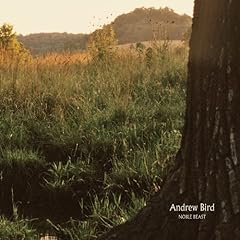
4/5
Andrew Bird holds an interesting honor in my life of music-- he was the first artist where I purchased an entire album on the basis of hearing just one song. Back in 2005, I heard "Fake Palindromes" off of Pitchfork (back when they actually did constructive track reviews). What really caught my attention was how unique that song sounded-- the looping, lush violins, his distinct singing style, the odd vocabulary choices... it was something different, I thought. While The Mysterious Production of Eggs was certainly a pleasing album, what really got me hooked was his earlier forays with his project Andrew Bird's Bowl of Fire: unapologetic swing revival with ripping violin solos.
So, fast forward 11 years after the Bowl of Fire debut Thrills-- which sounds like it was recorded coming out of an AM radio-- to Noble Beast. As Andrew Bird's music has progressed, it has evolved from swing to chamber pop to violin-driven indie pop to... plain pop??
Probably the most striking part of Noble Beast was how long into the album it took to really hear a violin featured. Despite downplaying what you could consider his "signature" sound, this album is surprising enjoyable as an entirely different affair. On this album, much more attention is given to percussion and the interplay of acoustic/electric guitar. His violin playing now adds a richer layer to the music, rather than being the major focus of every song. Where the changes he made in 2007's Armchair Apocrypha bored me at times, the innovation he has made this time around is much-welcomed.
Opening with the great "Oh No," the album starts off strong, with a sound very reminiscent of his previous albums. By the second track, "Masterswarm," Bird switches gears from his trademark "bah-bums" and whistling into experimentation with Latin/Flamenco-style percussion with looped finger-picked violin that surprisingly blend together very well.
By the time the album comes to "Not a Robot, but a Ghost," I realized I hadn't been imagining the fuzzed bass and distorted guitar laced throughout the first few tracks, and that Bird had really been branching out into new territory. With a beat that would sound in place on any Radiohead album, his violin floats along with vocals that seem to channel a bit of Thom Yorke as well. This track was certainly the most surprising, but also one of the most enjoyable.
From there, the album works to its close with a string of equally excellent tracks, with standouts being "Anonanimal" which features some of his best string looping/layering to date, and "Souverians," a sprawling 7-minute epic that has more musical ideas in one song than some bands can fit on a whole album.
The only real detraction from the album is the trio of "Effigy," "Tenuousness," and "Nomenclature." These three songs are all a little too similar in tempo (mostly downtempo) and feel to come right after each other. "Effigy" and "Nomenclature" aren't all too remarkable on their own, and when strung so close together I tended to lose interest during that stretch. Also a bit puzzling are the two brief instrumental interludes in the middle of the album, which don't seem to build off of the songs before them nor build into the songs that proceed them.
Overall, Noble Beast is a very enjoyable step in the always-evolving sound of Andrew Bird. This is a great album for first-time listeners (though, make sure to grab The Mysterious Production of Eggs ASAP) and should be a pleasant surprise for most long-time fans.
Tuesday, January 27, 2009
2008 (open letter to Fleet Foxes fanatics)
So, 2008 kind of caught me off guard. November rolled around, and there I was, struggling to really think of 5 albums that had grabbed my attention. Now, this may have been in part due to the fact that my Macbook crashed early in the year, leaving me in a tough spot to listen to albums I had previously bought/downloaded. Realizing I would want to make some sort of rough “Best Of” list, I scrambled to get my hands on as many 2008 albums as possible.
Best album of 2008, right!!? Well, not exactly. Don't get me wrong-- Fleet Foxes is a really good album. It is a great blend of ephemeral, woodsy folk and sunny pop that reminds of a simpler, more naturalistic time. Which was great the first time I heard it and it was Midlake's 2006 album The Trials of Van Occupanther:

This is not to say the bands are similar at all-- Midlake favors arrangements with strings, keytars, guitar solos, and a huge harmonic sound that sounds something like Fleetwood Mac meeting up with Coldplay writing the songs that Ben Folds never could, but it still does irk me a bit to hear Fleet Foxes talked about as the first band ever to make haunting, natural folk-inspired indie music.
Anyway, I don't want to focus on the negative: I really enjoyed “Ragged Wood,” “Quiet Houses,” and “Blue Ridge Mountains” off their debut. While I can see the merit of some of their songs with more sparse arrangements (i.e. “Sun It Rises” or "Tiger Mountain Peasant Song"), too many of them become unremarkable and/or boring for me (take for example, the closing track “Oliver James”). When you find it difficult to enjoy at least 3 songs on an album, how can you in good faith include it in your Top 10? I certainly can't.
That said, here are my actual favorite albums from 2008 (I'll spare lengthly individual write-ups for the time being since I'm getting to this so late and many have already been widely acclaimed-- those deserving a more in-depth review will likely see one in the coming weeks). Many of these were not discovered or fully discovered by me until the end '08, but I've given them enough listens in that I'm fairly confident in my rankings:
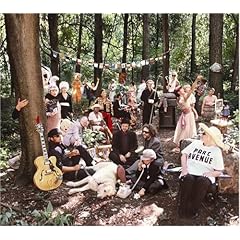
Plants and Animals – Parc Avenue [Secret City]
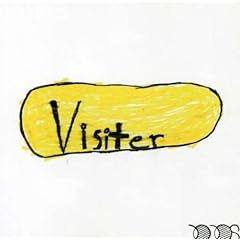
The Dodos – Visiter [French Kiss/Universal]
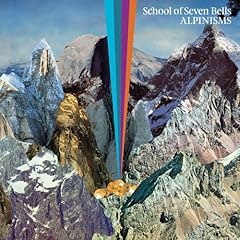
School of Seven Bells – Alpinisms [Ghostly International]

Dungen – 4 [Kemado]
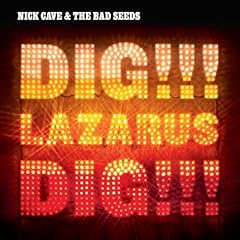
Nick Cave and the Bad Seeds – Dig, Lazarus, Dig!!! [Mute/Anti]
TV on the Radio – Dear Science [4AD]
The Welcome Wagon – Welcome to the Welcome Wagon [Asthmatic Kitty]
The Rosebuds – Life Like [Merge]
I'm from Barcelona – Who killed Harry Houdini? [Mute/EMI]
MGMT – Oracular Spectacular [Columbia]
Fahren Fahren Fahren on The Audiobahn
Look for (at least) weekly updates, with the first real post coming soon and reflecting on surprisingly-good-for-music 2008.
Hope you all enjoy this foray as much as I will!
KJ

